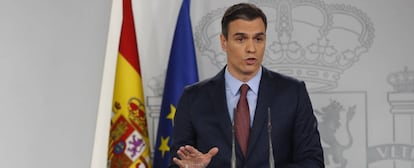PM due to make statement after seven-hour debate on state of alert measures
Draft decree includes banning all journeys in Spain apart from travel to work or to buy food. The delay on Saturday was reportedly due to differences between the Socialists and their coalition partners, Unidas Podemos

The Spanish Cabinet on Saturday was debating limiting the movement of citizens as much as possible in a bid to slow down coronavirus contagions in the country. Government ministers were discussing prohibiting all journeys in Spain that are not due to “force majeure,” but allowing trips so that people can get to work and purchase food. The decisions were included in a draft document produced at a special Cabinet meeting today ahead of the implementation of a state of alarm in Spain, a measure that was announced on Friday by Prime Minister Pedro Sánchez in a bid to combat the spread of the coronavirus.
The latest information supplied on Saturday by the central Health Ministry put the number of people in Spain infected by the coronavirus at 5,700, with at least 136 deaths from the Covid-19 disease and 517 patients cured and released from hospital.
The draft version of the decree implementing the state of alarm could be altered by the Spanish Cabinet, which debating the measures on Saturday for more than seven hours. Deputy Prime Minister Pablo Iglesias, who had said he was going to remain in a 14-day quarantine after his partner, Equality Minister Irene Montero, was confirmed as having been infected with the coronavirus this week, was present at the meeting of the Cabinet at La Moncloa prime ministerial palace.
The delay to the approval of the state of alarm by the Cabinet was reportedly due to disagreements between the partners in the coalition government, the Socialist Party (PSOE) led by Prime Minister Pedro Sánchez, and Unidas Podemos, led by Pablo Iglesias. The latter party was calling for better measures to assist workers who will be affected by the state of alarm and the ongoing coronavirus crisis according to government sources. The prime minister was due to have made a statement at 2pm, but sources from La Moncloa said on Saturday evening that Sánchez would not be speaking until after 8pm.
According to the draft decree for the state of alarm, which radio network Cadena SER first reported on and to which EL PAÍS has had access, journeys would be limited to the following:
1. The acquisition of foods, pharmaceuticals and essential items.
2. Access to healthcare centers.
3. Journeys to workplaces or to carry out labor, professional or company duties
4. Return journeys to habitual residences.
5. Assistance for and care of seniors, minors, dependents, the disabled or especially vulnerable people.
6. Journeys to financial institutions.
7. For reasons of force majeure or situations of necessity.
8. Any other activity that is justifiably necessary.
To sum up, people in Spain would only be able to move around if they need to go to work, buy foodstuffs or purchase pharmaceuticals. The government would essentially be locking down Spain, in measures that could go into force at 8am on Monday March 16, 2020.
To impede people from traveling, the draft decree states, “the head of the Interior Ministry will be able to impose the closure of freeways or sections of the same for reasons of public health, safety or movement of traffic, or the restriction of determined vehicles to them for the same reasons.”
The restrictions being introduced by the Spanish authorities are very similar to those that have been seen in Italy
Under the state of alarm, the government will call on companies to facilitate home working as far as possible. “Employees, both public and private, will be obliged to supply measures that allow for employees to carry out their work or public tasks via non-presential means wherever possible,” the draft decree reads. This means a scenario whereby production is not interrupted completely, but does oblige all businesses to send all workers home where possible.
The restrictions being introduced by the Spanish authorities are very similar to those that have been seen in Italy. Public transport is not being closed for now, but services connecting Spanish cities will see their frequencies reduced, by at least 50% according to the text.
The draft decree also guarantees the continuity of all basic supplies, including “the supply of foodstuffs” and the “operation of services at centers of production,” allowing for the distribution of produce to consumer sales points.
English version by Simon Hunter.
Tu suscripción se está usando en otro dispositivo
¿Quieres añadir otro usuario a tu suscripción?
Si continúas leyendo en este dispositivo, no se podrá leer en el otro.
FlechaTu suscripción se está usando en otro dispositivo y solo puedes acceder a EL PAÍS desde un dispositivo a la vez.
Si quieres compartir tu cuenta, cambia tu suscripción a la modalidad Premium, así podrás añadir otro usuario. Cada uno accederá con su propia cuenta de email, lo que os permitirá personalizar vuestra experiencia en EL PAÍS.
¿Tienes una suscripción de empresa? Accede aquí para contratar más cuentas.
En el caso de no saber quién está usando tu cuenta, te recomendamos cambiar tu contraseña aquí.
Si decides continuar compartiendo tu cuenta, este mensaje se mostrará en tu dispositivo y en el de la otra persona que está usando tu cuenta de forma indefinida, afectando a tu experiencia de lectura. Puedes consultar aquí los términos y condiciones de la suscripción digital.








































